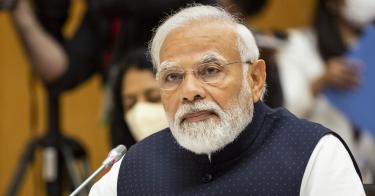At first blush, Taiwan’s diplomatic space seems to be shrinking. The number of countries offering Taiwan diplomatic recognition has been dwindling. Since 2019, Kiribati, the Solomon Islands, and Nicaragua have all switched recognition from Taiwan to the People’s Republic of China. Today, only 13 countries and the Vatican City still recognize the island state.
On the other hand, many countries that don’t formally recognize Taiwan are finding new ways to enhance diplomatic and economic linkages with Taipei, and India may be the most important among them.
In recent years, largely outside the headlines, India and Taiwan have quietly developed a robust economic relationship coupled with an expanding mélange of political interactions. In December 2021, the two countries began negotiations on Free Trade Agreement, with a special focus on developing India into a semiconductor manufacturing hub. According to Taiwan envoys to India, bilateral trade hit new records in 2021 at over $7 billion, and over 120 Taiwanese companies are operating in India with cumulative investments over $2.3 billion. This year, the State Bank of India raised $300 million issuing Taiwanese “Formosa bonds,” the first Indian commercial entity to do so.
On the diplomatic front, the Indian government of Prime Minister Narendra Modi and the ruling Bharatiya Janata Party (BJP) has expanded political engagements with Taiwan. Last May, two BJP members of parliament virtually attended the swearing-in ceremony of Taiwan President Tsai Ing-wen. One month earlier, India’s Ministry of External Affairs tweeted condolences to Taiwan after a railway accident. Taiwanese officials reciprocated days later after an ambush on Indian security personnel by Maoist insurgents. In October 2021, Taiwan’s senior envoy to India, the head of The Taipei Economic and Cultural Center in New Delhi, met with the head of the Tibetan Government in Exile based in Dharamsala.
>>> Give Taiwan What It Thinks It Needs—Just in Case
The development of India-Taiwan relations has been a long time coming. In the 1950s, India was one of the first Asian capitals to recognize the People’s Republic of China and its One China principle, putting India-Taiwan relations into a deep freeze for the Cold War. A diplomatic breakthrough would have to wait until the collapse of the Soviet Union and the launching of India’s “Look East” policy in 1991. Four years later, the two countries established representative offices in Taipei and New Delhi.
Over the ensuing decade and a half, the two sides began incrementally enhancing engagement, signing a bilateral investment agreement, launching cross-capital direct flights, exchanging parliamentary delegations, and signing memorandums to expand science, technology, and space cooperation. A former Indian defense secretary addressed a conference in Taipei; the head of Taiwan’s Kuomintang party did the same in New Delhi.
Throughout this exploratory phase, the Indian government remained cautious and sensitive to Beijing’s One China principle. Yet, by the early 2010s India’s deferential approach to China began to weaken as bilateral ties grew more contentious, punctuated by a series of mini-crises and the rise of a more assertive China under Communist Party Chairman Xi Jinping.
In 2010, China-India relations hit a roadblock when Beijing denied a visa to an Indian military commander based in Kashmir, challenging India’s sovereignty over the territory claimed by China’s all-weather friend, Pakistan. India responded by suspending military ties with China and demanding Beijing recognize a “One India” principle—acknowledging Indian sovereignty over Kashmir and Arunachal Pradesh—if it expected New Delhi to continue paying homage to the One China Principle. Beijing relented on the visa issue but not on the sovereignty question. India has refrained from recognizing the One China principle in joint statements ever since.
The same year, India and Taiwan eased visa requirements for each other’s citizens and recognized degrees from each other’s universities, while former Indian President AJ Abdul Kalam paid a visit to Taiwan. In 2011, India hosted Taiwan’s Education minister, several deputy ministers, and the former Chairperson of the Taiwan Democratic Progressive Party (and future President) Tsai Ing-wen. The two sides also signed customs and double taxation avoidance agreements while Taiwan opened a second representative office in Chennai.
In 2014, the BJP swept parliamentary elections and Narendra Modi was named prime minister, and the relationship picked up more momentum. Taiwan’s trade representative, its senior-most official New Delhi, was invited to attend his swearing-in ceremony. Modi was one of the few Indian politicians with legitimate Taiwan experience: in 1999 he visited the island as General Secretary of the BJP, and in 2011 he had hosted the largest-ever Taiwanese business delegation in India as the chief minister of Gujarat. In 2012, Taiwanese officials attended the Vibrant Gujarat conference in Modi’s home state.
When Tsai Ing-wen won Taiwan’s presidential election in January 2016, an Indian scholar and a BJP official attended her inauguration while BJP General Secretary Ram Madhav tweeted her congratulations. The same week, former Taiwanese Foreign minister Hung-mao Tien was featured as a speaker at the Raisina Dialogue conference in New Delhi.
In December 2016, one dozen Indian MPs formed a new India-Taiwan Parliamentary Friendship forum. The following February, India hosted a delegation of female Taiwanese parliamentarians. China’s nationalist Global Times warned that India was “playing with fire” by using China’s “Achilles’ heel” [i.e., Taiwan] as a “bargaining chip.” The paper threatened: “Those who want to use the Taiwan question to contain [China] will have to suffer losses.” Later that year, the Chinese and Indian militaries became embroiled in an unprecedented border crisis on the Doklam plateau.
>>> The Future of the Quad Is Bright
In 2018, the Indian parliament’s standing committee on external affairs released a report urging the government to abandon a “conventionally deferential foreign policy toward China” and suggesting it “contemplate using all options including its relations with Taiwan.” It added: “even when India is overtly cautious about China’s sensitivities while dealing with Taiwan and Tibet, China does not exhibit the same deference while dealing with India’s sovereignty concerns.”
A Times of India editorial echoed this sentiment in April 2021: "Taiwan knows China best, which is why cooperation with Taipei makes strategic sense for New Delhi…Beijing clearly doesn’t respect ‘One India.’ There is no reason then for India to be overly sensitive about China’s territorial claims." Public opinion in India has never been particularly sympathetic to China. But perceptions of China, which had already been trending negative for years, turned overtly hostile after a border crisis in 2020 resulted in nearly two dozen Indian casualties.
Whether India-Taiwan links expand further in the years ahead will depend on the Modi government and the future course of China-India relations. The desire for expanded engagement from Taiwan is clearly there. India features prominently in the “New Southbound Policy” championed by President Tsai in recent years.
If the Modi government does seek to elevate ties further, U.S.-based Taiwan expert Michael Mazza notes that it has a range of available options, from combined military exercises to Track 1.5 defense dialogues, coast guard training, expanded parliamentary interactions, and clean energy cooperation initiatives. Other options include establishing a joint fusion center on influence operations or inviting India to join the Global Cooperation and Training Framework, a platform jointly administered by the U.S., Taiwan, and Japan that “allows practitioners from around the world to learn what Taiwan has to offer and to strengthen connections between experts.” India and the U.S. could also start their own separate Track 1.5 dialogue on Taiwan or add discussions on Taiwan to regular meetings of the Quad grouping joining Australia, India, Japan, and the U.S.
Taiwan needs friends more than ever. It is always a willing partner. For now, the ball is in the Indian government’s court.
This piece originally appeared in RealClear World




